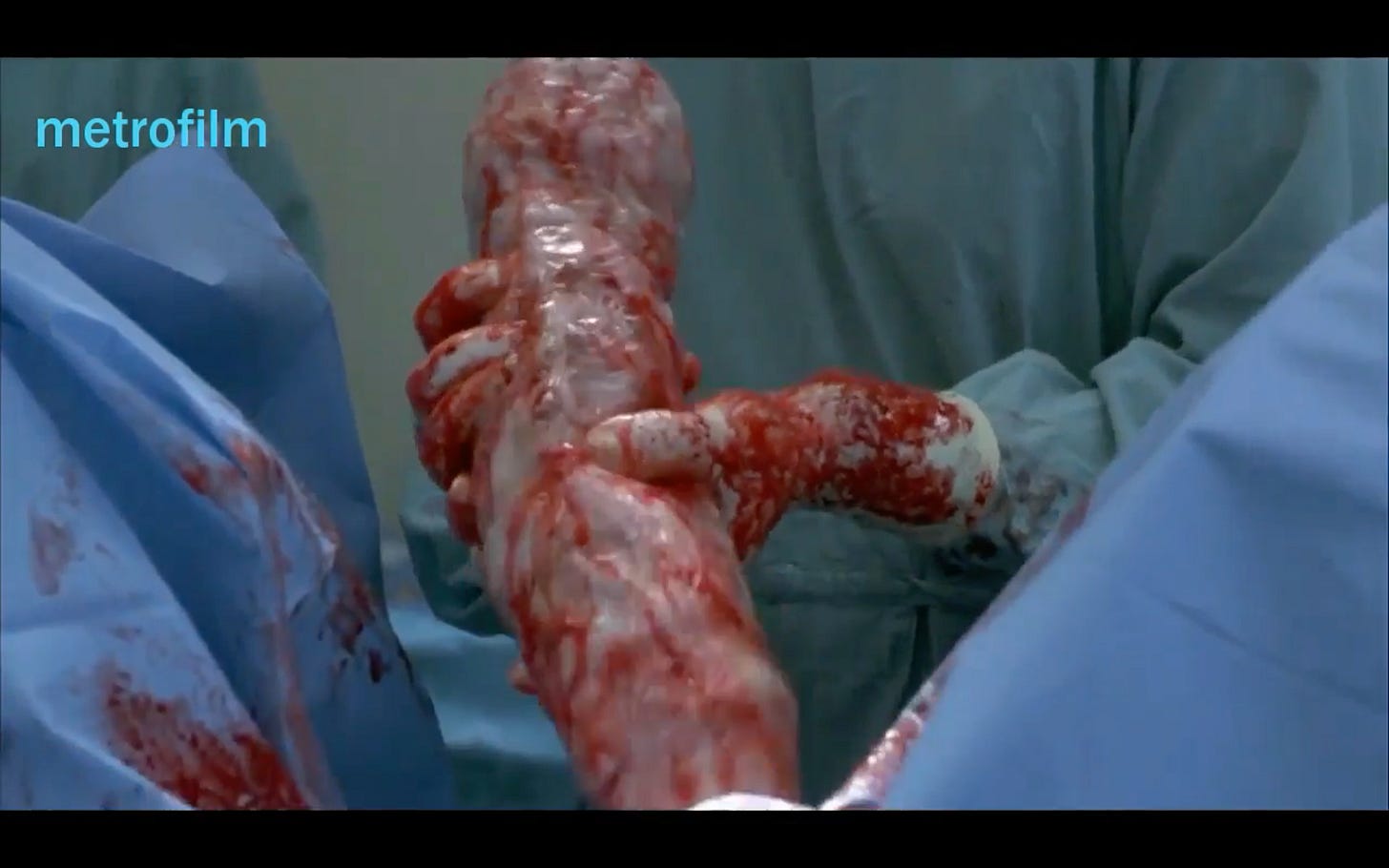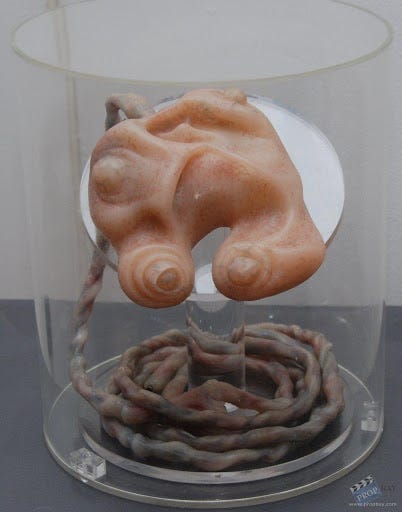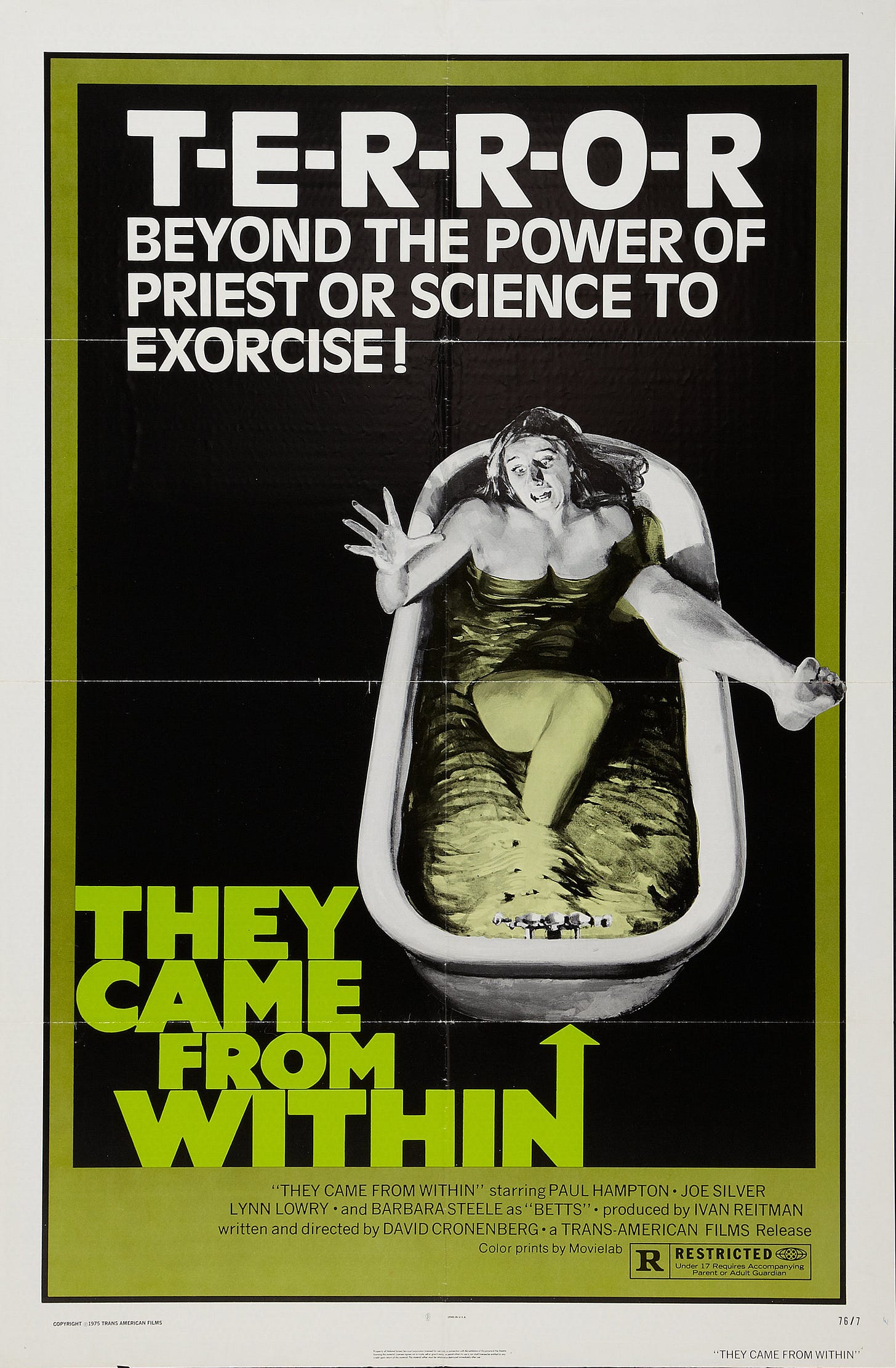Evgenia Kovda on David Cronenberg and procreation horror
“Or how I had to finally grow up and learn about the uterus.”
I’m an only child and never spent much time around pregnant women or babies. So it was only at the ripe age of thirty that I for the first time faced the question of human reproduction. Now that I am pregnant I’m finding that I have a new appreciation for David Cronenberg. I always loved his films, but it’s only when I got knocked up did I realize how much they’re inspired by the bio-mechanics of procreation — and how much he gets it right.
His films are obsessed with birth and reproduction. And weirdly enough, he looks like an expensive Beverly Hills gynecologist in real life. He even plays an OBGYN who delivers Geena Davis’ maggot baby in the dream sequence of The Fly. So it makes sense. Form follows content. The medium is the message.
A very trusted source of mine — a Canadian friend whose mom went to the same university as David Cronenberg — told me that David was known for being a downer at parties he went to because all he wanted to do was talk about viruses and parasites. He’s very much into the subject matter of disease, and his movies clearly reflect that early interest. And since life is the ultimate sexually transmitted disease, it makes sense that many of his films are about how it gets passed on.
Most of his best films aren’t just thematically about birth, they’re filled with images and shapes taken — or shall we say, appropriated — from the female reproductive system. Even details like the gamepod in Existenz is ripped off from a placenta. It’s obvious when you look at it, but I only realized it after I got pregnant. Clearly I’ve been alienated from the means of reproduction.
Cronenberg is obviously not the only filmmaker inspired by human reproduction. Alien is probably the best-known example. But there are other great ones and all of them are made by men. There’s Rosemary’s Baby and Village of the Damned — both of which are based on books written by men and adapted into films by men. Then there is Total Recall with its mutant-siamese-baby-messiah Kuato. And of course there’s Eraserhead, which has maybe the scariest infant in the the history of film.
And when the baby kicks me hard from inside my belly or I writhe in pain at night, cramping and spasming because she is butting her head up against my kidneys, intestines, and nerve clusters, I definitely think of Alien. But in reality it’s not an “alien” that is inside of me. It’s not a foreign body. It wasn’t implanted by a demonic force and it didn’t come from a monster in outer space. It’s of my own creation. So it’s the opposite of an alien — it’s a “native” if anything. And this is what Cronenberg gets right when others don’t: “they come from within.”
Now that I’m eight months pregnant and have my body taken over by a parasite of my own co-creation, it makes me face the fact that we are closer to parasites than we are ready to admit. Until about hundred years ago and the invention of antibiotics and widespread use of disinfection, women would routinely die in childbirth. It was a scary, dangerous thing. Women went into it knowing that they might give birth to a new life but that they might die in pain and agony.
So it’s surprising and bizarre to me that most women today consider pregnancy and childbirth as something rosy and sunny and etherial. They even change the timbre of their voice to talk about it, squealing in high pitches and referring to their unborn child as “a bundle of joy.” To me this sentimentality is bewildering. Cronenberg’s vision of it much closer to my experience so far — and one thing his films never succumb to is sentimentality.
I believe that sentimentality kills real emotion, whether in life or on the screen. Procreation is the last thing that should be looked at sentimentally — with all the blood, pain and ultimately the baby itself — the new human who is a proof and reminder of your own mortality. Eros and Thanatos come together in childbirth, so why not embrace it? It’s both the end of you, the bifurcation of your old self and the beginning of a new love story. Or as they say, “having children is to decide forever to have your heart go walking around outside your body.”
Cronenberg always goes for real emotions and raw imagery, not sentimental cliches. And yet his films are much more humanist than most of sentimental trash produced by Hollywood. In one interview Cronenberg openly talks about his belief system:
“I consider myself a junior existentialist. When I started to read Sartre and by association Heidegger I thought, “Oh wow, this is what I’ve been thinking.” There’s a great lecture Sartre gave called “Existentialism is a Humanism”. He basically said, “Look, we humans are really all we’ve got, forget about the afterlife, it doesn’t exist. Forget about God, there is no God. We should accept that and if we did and realized that compassion and humanistic empathy were valuable – more than valuable but crucial – then the world would be a better place.” So that’s really my approach to life.”
It makes sense that a self-proclaimed existentialist would be focused on the body and its experiences — since that is the first fact of our life.
Why do dark and interesting takes on human reproduction in film come mostly from men? I guess it’s because men are more of passive participants and can maintain outside observer position better. Maybe women are too involved in the process, too committed to it. And so they end up looking at it from the blurry lens of saintly motherhood and sentimentality, which cuts out pretty much everything that’s interesting about it.
Anyway, it really is shocking how obsessed Cronenberg is with procreation. Just look at the list.
Shivers or They Came from Within — A deranged doctor creates a parasite that is a mix of aphrodisiac and venereal disease, which causes uncontrollable sexual desire and wreaks total havoc among respectable middle class condo-dwellers in Montreal.
The Brood — Parthenogenetically born form an external uterus, a pack of deformed babies act as hitmen for their mother’s murderous desires.
Scanners — A sedative administered to pregnant women had an unexpected side-effect. It created very powerful telepaths, “scanners” who have psychokinetic powers and want to take over the world.
Dead Ringers — A gynecologist falls in love with a patient, a woman who is barren because she has a trifurcated cervix. The love affair destroys the parasitic symbiosis he had with his twin brother, also a gynecologist, and kills them both
The Fly — Geena Davis’s character learns that she is pregnant from Jeff Goldbloom’s, who is rapidly becoming a fly after teleportation experiment goes wrong. She has a nightmare of having a giant fly maggot baby, which is delivered by a doctor played by Cronenberg himself.
Existenz — There’s a placenta-like gamepod that gets inserted into the spinal cord and connects you to an addictive virtual reality game.
Maps to the Stars — A husband and wife, who are also brother and sister, have to deal with their violent daughter who is also determined to marry her brother.
In some parallel universe Cronenberg probably is working as a creepy OBGYN who gets busted for experimenting on his subjects with new and unapproved methods.
—Evgenia Kovda








Wow -- that is well written. Do I now need to watch all these movies?
Really enjoyed this, Evgenia. My husband and I inexplicably decided to watch a slew of Cronenberg’s early works when I was 6-ish months pregnant last year. Now it makes me think something subliminal was going on. The Brood in particular stood out at the time.
Also share your reservations around pre-natal sentimentality. I think a lot about how, 100 years ago, or even less, I likely would’ve died in childbirth, given our breech baby’s enormous head and her decision to cannonball out ass-first. But it is, despite those misgivings, pretty psychedelic. And fun.
I’m looking forward to more of your thoughts up to and after the birth! All the best to everyone!